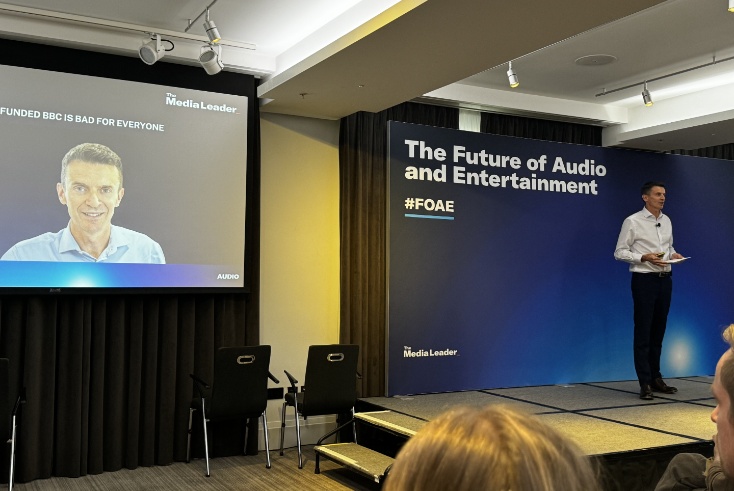The Future of Audio and Entertainment
What would happen to the market if the BBC were to introduce ads against its content?
Would it grow the pie and give more options for agencies and advertisers? Or would it lead to market collapse and leave the service unrecognisable from the one we know today? This was a key debate at The Future of Audio and Entertainment last week.
BBC plan to commercialise podcasts ‘could be catastrophic’
Analysis: Genuine concern
In a presentation at The Future of Audio and Entertainment, Radiocentre CEO Matt Payton argued that BBC might not stop at podcast advertising and could consider radio, online and TV advertising further down the line.
While he did not want to “have a predictable swipe” at the BBC on behalf of the commercial sector, there’s “a genuine concern” that an ad-funded model for BBC Radio “would be bad for audiences, bad for advertisers and ultimately bad for the BBC itself”.
Radiocentre commissioned a study on the impact of advertising-funded BBC radio services and found several “challenges” with this model.
Among the key findings are that the size of radio advertising is “not sufficient” to fund both the BBC and the commercial sector; the BBC does not offer the more valuable younger audiences for advertisers; and there is not a “premium on quality” in radio advertising.
Payton explained: “While advertisers value the reach and demographic of audiences, they generally don’t pay a premium for quality. In fact, speech radio and news radio, where the BBC is particularly strong, actually deters some advertisers.”
Ad-funded BBC ‘can lead to market failure’
He concluded his presentation by saying: “An ad-funded BBC would be bad for everyone. Most BBC radio services would be unviable and the remaining BBC services would be weakened and pretty unrecognisable.
“Commercial radio would be significantly — perhaps irreparably — damaged and the choice available to listeners will be narrowed or stations disappear.
“The range of choice for advertisers will also be limited, with some of the strongest elements of radio advertising being undermined, including its reach, its resonance and its ability to target across a range of stations. While the economic and creative value of UK radio will be fatally damaged.”
Major consequences for the industry
In another session, Bauer Media Audio UK CEO Simon Myciunka echoed these concerns.
He compared with BBC’s plan with the audio market in Ireland, where the state broadcaster is ad-funded, but there are “lots of guardrails around that”.
Myciunka stressed: “I think it could have really big consequences for adland. If you look at the BBC, it’s funded by £3.8bn worth of licence fee payer money and, unlike TV, the BBC are really dominant in the audio space.
“So I think it could have huge consequences for commercial broadcasters in the UK. I think that’s further compounded by the fact that the BBC also announced that they were going to launch new radio stations on BBC Sounds and on DAB as well and we have issue with the fact that they are not distinctive.
“And, in fact, we think that they copy lots of services that are already available from Global, from Bauer, from Boom Radio, for example.”
Myciunka added that “we would much prefer” the BBC to look to “provide distinctiveness” moving forward.
BBC digital music expansion plans face pushback from commercial radio
Myciunka also highlighted that when the last BBC charter was put in place, a “future-facing digital-first strategy” was “not in existence”.
He explained: “As we approach the next BBC charter, we absolutely should look at how it’s funded and, indeed, what the wider BBC mandate is, because it’s an incredibly important institution.
“But I think the risk is that embracing a digital-first strategy gains a lot of momentum without appropriate regulation and that’s really, really damaging not just for the BBC, but also for the creative industries as well.”
Different markets
At The Future of Audio and Entertainment, some figures who spoke to The Media Leader argued that since the radio and podcast advertising markets in the UK are so distinct, perhaps the BBC carrying podcast ads would not have such a huge effect.
Others conceded that the BBC had to “explore all the options on the table” given the pressures it is under.
Matt Deegan, founder of Folder Media, said: “Podcast fill rates are already suffering from excess inventory; adding BBC downloads to that will just depress them more.
“Fundamentally, though, the income the BBC will get will be way below their projections. They’re just doing ads, whilst the premium revenue comes from live reads; there will be loads of categories they don’t want, like gambling, and there’s nothing on news shows, so they will go to all of this trouble and make just hundreds of thousands of pounds.”
Deegan added that it would also complicate the licence fee discussion and “break the clarity [that] the BBC is ad-free in the UK”.
Adwanted UK are the audio experts operating at the centre of audio trading, distribution and analytic processing. Contact us for
more information on J-ET, Audiotrack or our RAJAR data engine. To access our audio industry directory, visit
audioscape.info and to find your new job in audio visit
The Media Leader Jobs, a dedicated marketplace for media, advertising and adtech roles.




